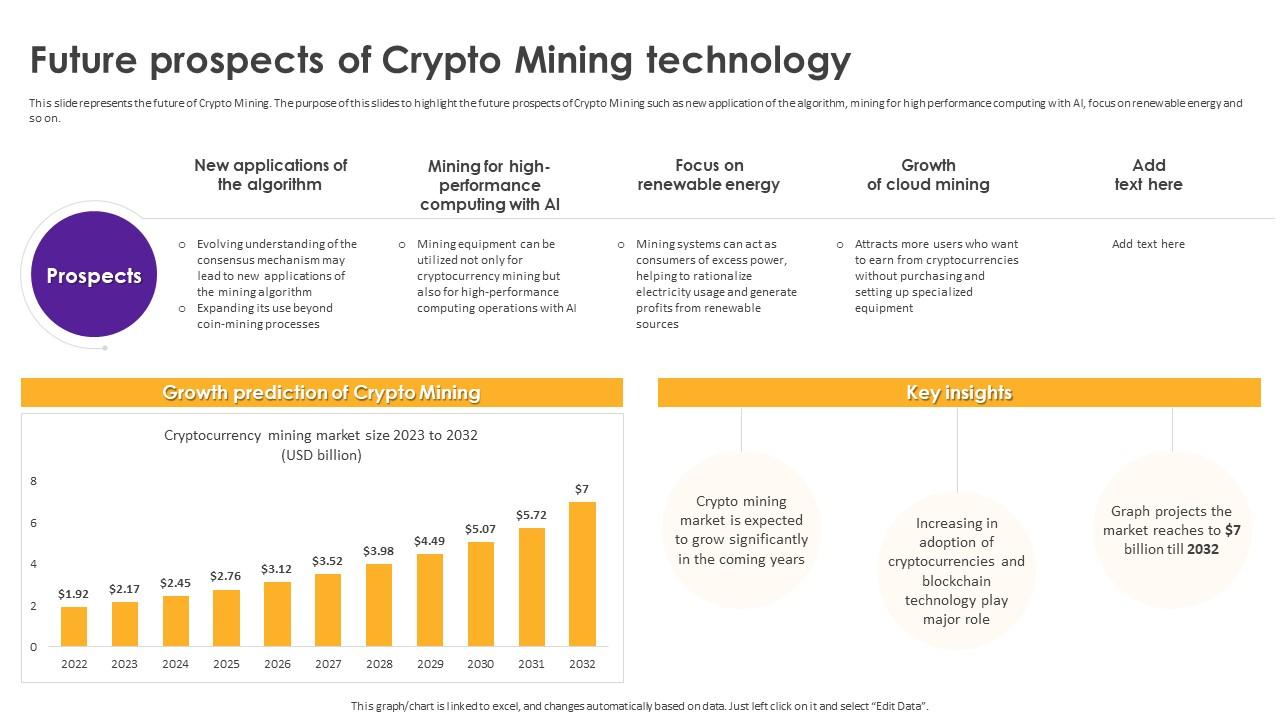The Future of Cryptocurrency Mining: Trends and Technologies

- The Rise of Green Mining: Sustainable Practices in Cryptocurrency Mining
- Decentralized Mining Pools: The Future of Collaborative Mining
- AI and Machine Learning in Cryptocurrency Mining: Enhancing Efficiency and Profitability
- The Emergence of Proof of Stake: A Shift from Proof of Work in Cryptocurrency Mining
- Quantum Computing and Cryptocurrency Mining: Potential Threats and Opportunities
- Regulatory Challenges and Compliance in Cryptocurrency Mining: Navigating the Legal Landscape
The Rise of Green Mining: Sustainable Practices in Cryptocurrency Mining
As the demand for cryptocurrencies continues to rise, so does the energy consumption associated with mining them. In response to growing concerns about the environmental impact of cryptocurrency mining, the industry is seeing a shift towards more sustainable practices. This has led to the rise of green mining, which focuses on reducing the carbon footprint of mining operations through the use of renewable energy sources and energy-efficient technologies.
One of the key drivers behind the rise of green mining is the increasing pressure from both investors and regulators for companies to adopt more environmentally friendly practices. This has led to a growing number of mining operations turning to renewable energy sources such as solar, wind, and hydroelectric power to power their operations. By harnessing the power of these clean energy sources, mining companies can significantly reduce their carbon emissions and lessen their impact on the environment.
In addition to using renewable energy sources, mining companies are also investing in energy-efficient technologies to further reduce their energy consumption. This includes the use of more efficient mining hardware, cooling systems, and data center designs. By optimizing their operations for energy efficiency, mining companies can not only reduce their environmental impact but also lower their operating costs.
Decentralized Mining Pools: The Future of Collaborative Mining
Decentralized mining pools are emerging as a promising solution for the future of collaborative mining in the cryptocurrency space. These pools operate on a peer-to-peer network, allowing miners to join forces and share resources without the need for a central authority. This decentralized approach offers several advantages over traditional mining pools, including increased security, transparency, and autonomy for participants.
By leveraging blockchain technology, decentralized mining pools can ensure that all transactions are recorded securely and transparently on the distributed ledger. This not only reduces the risk of fraud and manipulation but also provides miners with greater control over their earnings and rewards. Additionally, decentralized pools can help to mitigate the centralization of mining power, promoting a more democratic and inclusive mining ecosystem.
One of the key benefits of decentralized mining pools is the ability to pool resources and collaborate with other miners without relying on a single entity to manage the pool. This distributed approach can help to reduce the risk of downtime and ensure a more stable and reliable mining experience for participants. Furthermore, decentralized pools can offer greater flexibility in terms of payout options and reward structures, allowing miners to choose the most suitable model for their needs.
AI and Machine Learning in Cryptocurrency Mining: Enhancing Efficiency and Profitability
Artificial Intelligence (AI) and Machine Learning are revolutionizing the field of cryptocurrency mining by enhancing efficiency and profitability. These advanced technologies are being utilized to optimize mining operations, improve decision-making processes, and increase overall productivity.
AI algorithms can analyze vast amounts of data to identify patterns and trends, allowing miners to make more informed decisions about which cryptocurrencies to mine and when to mine them. Machine Learning algorithms can also be used to predict future price movements and optimize mining strategies accordingly.
By leveraging AI and Machine Learning in cryptocurrency mining, miners can reduce operational costs, increase mining speed, and maximize profits. These technologies enable miners to adapt to changing market conditions quickly and efficiently, giving them a competitive edge in the industry.
The Emergence of Proof of Stake: A Shift from Proof of Work in Cryptocurrency Mining
The emergence of Proof of Stake (PoS) marks a significant shift in the world of cryptocurrency mining, moving away from the traditional Proof of Work (PoW) model. PoS is gaining popularity due to its energy efficiency and reduced environmental impact compared to PoW. In PoS, validators are chosen to create new blocks and validate transactions based on the number of coins they hold, rather than computational power.
This shift towards PoS is driven by the desire to address the scalability and energy consumption issues associated with PoW. By requiring validators to stake a certain amount of coins as collateral, PoS incentivizes them to act honestly to maintain the security of the network. This consensus mechanism is seen as a more sustainable and environmentally friendly alternative to PoW.
Furthermore, PoS has the potential to make cryptocurrency mining more accessible to a wider range of participants, as it does not require expensive mining equipment or high electricity consumption. This democratization of mining could lead to a more decentralized network, reducing the influence of large mining pools and promoting greater network security.
Quantum Computing and Cryptocurrency Mining: Potential Threats and Opportunities
Quantum computing has the potential to revolutionize the field of cryptocurrency mining, presenting both threats and opportunities for miners. On one hand, quantum computers have the ability to solve complex mathematical problems at a much faster rate than traditional computers, which could potentially make current encryption methods used in cryptocurrency mining obsolete. This poses a significant threat to the security of cryptocurrencies, as quantum computers could potentially break through the cryptographic algorithms that currently protect transactions.
On the other hand, quantum computing also presents opportunities for cryptocurrency miners to enhance their mining operations. Quantum computers could potentially increase the speed and efficiency of mining processes, allowing miners to solve complex algorithms more quickly and mine cryptocurrencies at a faster rate. This could lead to increased profitability for miners and a more competitive mining landscape.
It is important for cryptocurrency miners to stay informed about the developments in quantum computing and to adapt their mining strategies accordingly. By staying ahead of the curve and exploring ways to leverage quantum computing technology in their mining operations, miners can position themselves to take advantage of the opportunities presented by this emerging technology while also mitigating the potential threats it poses to the security of cryptocurrencies.
Regulatory Challenges and Compliance in Cryptocurrency Mining: Navigating the Legal Landscape
When it comes to cryptocurrency mining, one of the biggest challenges that miners face is navigating the complex regulatory landscape. Governments around the world are still trying to figure out how to regulate this relatively new industry, which can lead to uncertainty and confusion for miners.
Compliance with regulations is crucial for cryptocurrency miners to avoid legal issues and potential fines. Some of the key regulatory challenges that miners may encounter include:
- Unclear regulations: Many countries have not yet established clear guidelines for cryptocurrency mining, leaving miners unsure of what is allowed and what is not.
- Electricity consumption: The high energy consumption of cryptocurrency mining operations has raised concerns about environmental impact and sustainability, leading to potential regulations on energy usage.
- Tax implications: Cryptocurrency mining can have tax implications that vary from country to country, making it essential for miners to stay informed about tax laws and reporting requirements.
- AML/KYC regulations: Anti-money laundering (AML) and know your customer (KYC) regulations may apply to cryptocurrency mining operations, requiring miners to implement compliance measures to prevent illegal activities.
Despite these challenges, many miners are working to stay ahead of regulatory changes by partnering with legal experts and industry organizations to ensure compliance. By staying informed and proactive, miners can navigate the legal landscape and continue to operate successfully in the cryptocurrency mining industry.





